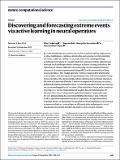Discovering and forecasting extreme events via active learning in neural operators
Author(s)
Pickering, Ethan; Guth, Stephen; Karniadakis, George Em; Sapsis, Themistoklis P
Downloads43588-022-00376-0.pdf (2.525Mb)
Publisher Policy
Publisher Policy
Article is made available in accordance with the publisher's policy and may be subject to US copyright law. Please refer to the publisher's site for terms of use.
Terms of use
Metadata
Show full item recordAbstract
Extreme events in society and nature, such as pandemic spikes, rogue waves or structural failures, can have catastrophic consequences. Characterizing extremes is difficult, as they occur rarely, arise from seemingly benign conditions, and belong to complex and often unknown infinite-dimensional systems. Such challenges render attempts at characterizing them moot. We address each of these difficulties by combining output-weighted training schemes in Bayesian experimental design (BED) with an ensemble of deep neural operators. This model-agnostic framework pairs a BED scheme that actively selects data for quantifying extreme events with an ensemble of deep neural operators that approximate infinite-dimensional nonlinear operators. We show that not only does this framework outperform Gaussian processes, but that (1) shallow ensembles of just two members perform best; (2) extremes are uncovered regardless of the state of the initial data (that is, with or without extremes); (3) our method eliminates 'double-descent' phenomena; (4) the use of batches of suboptimal acquisition samples compared to step-by-step global optima does not hinder BED performance; and (5) Monte Carlo acquisition outperforms standard optimizers in high dimensions. Together, these conclusions form a scalable artificial intelligence (AI)-assisted experimental infrastructure that can efficiently infer and pinpoint critical situations across many domains, from physical to societal systems.
Date issued
2022Department
Massachusetts Institute of Technology. Department of Mechanical EngineeringJournal
Nature Computational Science
Publisher
Springer Science and Business Media LLC
Citation
Pickering, E., Guth, S., Karniadakis, G.E. et al. Discovering and forecasting extreme events via active learning in neural operators. Nat Comput Sci 2, 823–833 (2022).
Version: Final published version